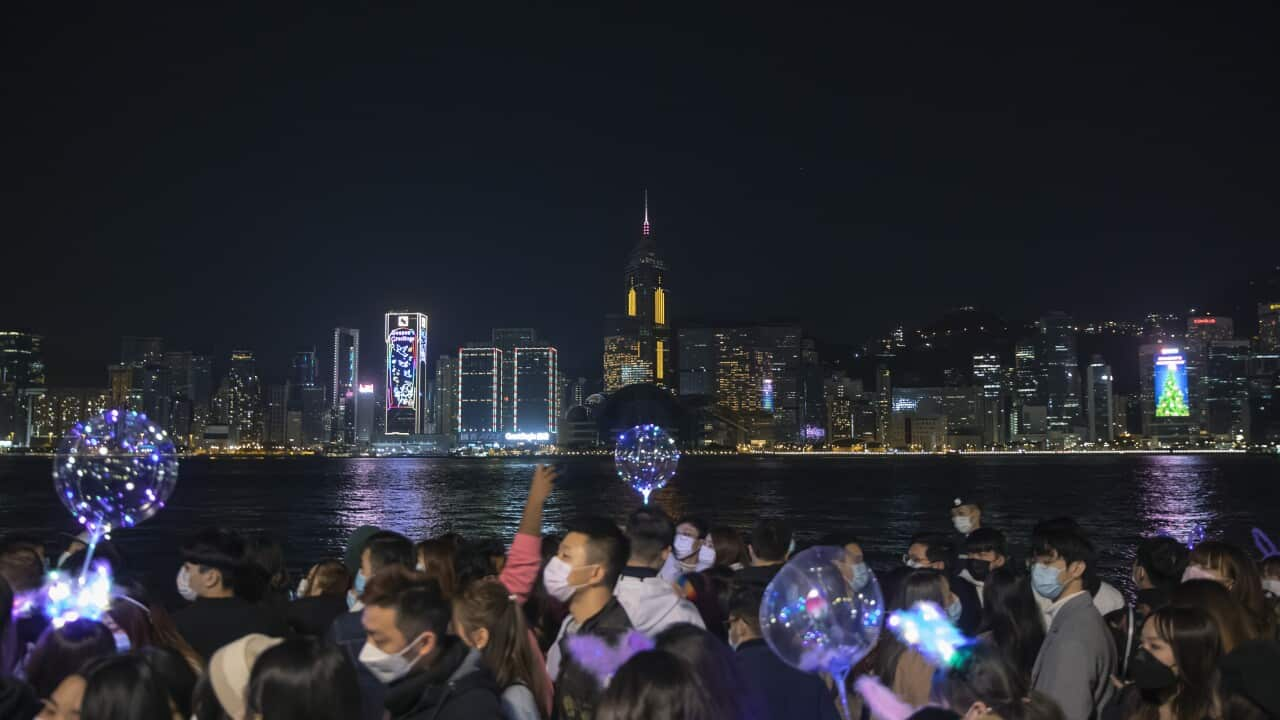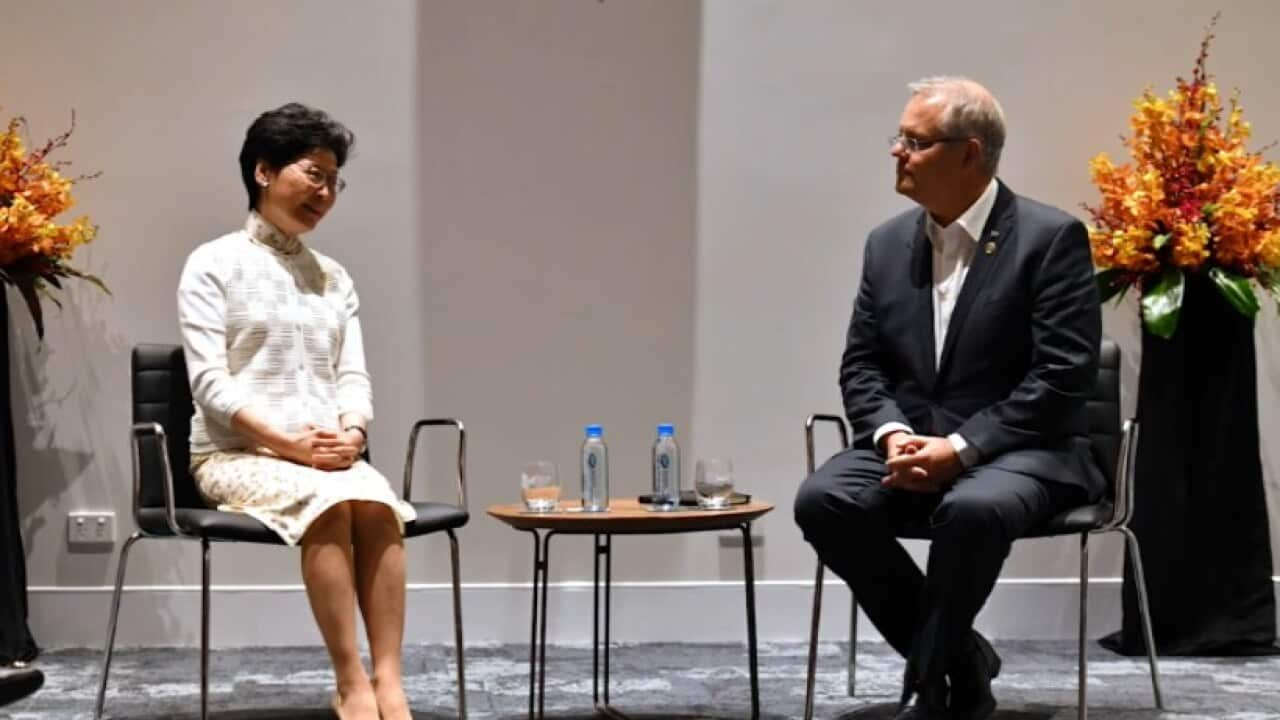A from the Department of Home Affairs on the processing of Subclass 866 onshore protection visas indicated that fewer than five Hong Kong passport holders had their applications approved in December.
The allocation marked the first time that such visas were granted to passport holders from the territory since at least 2010, according to data obtained by SBS Chinese under the Freedom of Information Act, which provided a month by month breakdown on the groups receiving protection.
SBS Chinese had requested data from 1997 to 2020, though only received statistics from July 2010.
The data also showed that 560 Hong Kong passport holders had applied for protection in Australia since 2010, with 270 individuals lodging their applications since pro-democracy protests erupted in June 2019.
The status of these applications may or may not be ongoing, though migration agents agree that the maximum processing time is around three years. Elvis* is in exile in Australia after he was charged with three offences including rioting while participating in the protest in the territory.
Elvis* is in exile in Australia after he was charged with three offences including rioting while participating in the protest in the territory.

Refugee and humanitarian permanent visa applications from Hong Kong passport holders. Source: SBS
He applied for an Australian protection visa through a migration lawyer in September 2020.
Although he is yet to receive an update on his application, he’s confident there will be a growing number of successful applications for Hongkongers like him.
"Once the first application [wave] is approved, there will be second, third, and fourth,” he says. He says he held fears that international attention regarding the plight of Hongkongers would decrease when the pro-democracy protests ceased, which would in turn cause Australia to tighten its approval process for protection visa applications.
He says he held fears that international attention regarding the plight of Hongkongers would decrease when the pro-democracy protests ceased, which would in turn cause Australia to tighten its approval process for protection visa applications.

Hongkonger Elvis* allied for protection in Australia in September. Source: SBS, Supplied
Though thankfully for him, the opposite has occurred, and he says the current environment allows him to "see the light”. The Home Affairs data showed that since China implemented the Hong Kong National Security Act last July, a total of 106 Hong Kong citizens applied for protection during the second half of the year, including a record 34 in July itself.
The Home Affairs data showed that since China implemented the Hong Kong National Security Act last July, a total of 106 Hong Kong citizens applied for protection during the second half of the year, including a record 34 in July itself.

Hong Kong police officers pinning down a protester during Wednesday’s demonstration. Source: Getty
The introduction of the controversial law was rebuked by Prime Minister Scott Morrison, who announced by extending their temporary visas by five years and providing a pathway to permanent residency.
Furthermore, the advice provided on the government’s website was updated to say the law “could be interpreted broadly” and Australian citizens in Hong Kong “could break the law without intending to”.
In January, after , Australian Foreign Minister Marise Payne issued a criticising the law for “curtailing the rights and freedoms of the people of Hong Kong".
A Home Affairs spokesperson told SBS Chinese: “Decisions on protection visa applications are made based on contemporary country information and the personal circumstances of the applicant at the time the decision is made. The department does not prioritise the processing of protection visa applications on the basis of nationality.”
“Decisions on protection visa applications consider the criteria for the grant of a protection visa including, amongst others, whether the applicant is a refugee or whether the person is at real risk of significant harm in their receiving country,” the spokesperson concluded.
Jessica Williamson, the chief executive of WLW Migration Lawyers, a firm assisting a number of clients from Hong Kong to apply for protection visas, says the Department of Home Affairs, “generally forms a view as to the type of person that would be at continued risk by using country information from various sources including from DFAT”.
“It is certainly a positive indication that Australia recognises people can be refugees from Hong Kong,” she says.
However, Ms Williamson emphasises that it is unlikely to mean all applicants from Hong Kong will experience a “straight forward refugee determination process”.
In her work with applicants, she asserts she has not seen a quicker processing time for this group, compared to people from other countries.
“The department assesses each matter on a case-by-case basis and will be carefully assessing the credibility and the individual profile of each applicant from Hong Kong to decide if their claims are believed and if they would be of continued interest on return to Hong Kong.”
Home Affairs does not advertise processing times for protection visa applications, though she says the process can often take between 18 months and three years for an outcome.
“COVID-19 impacted the processing times as the department stopped having in-person interviews in March 2020 and only started offering telephone interviews towards the end of 2020."
Elvis says he holds fears for the three protesters who were arrested alongside him. Two were recently found not guilty, while one was convicted of assaulting police.
“[When I read the news] I was heartbroken, nearly in tears, and have a sense of guilt.
“I asked his relatives if they needed help."
He believes he will not be able to return to Hong Kong as a result of the crackdown.
Despite the hardships endured, Elvis affirms that he frequently comes across people online who express their fears that Hongkongers are "pretending to be refugees".
He says such sentiments make him feel "upset", although he understands that many Australians feel it's vital to take care of their own citizens before foreigners.
He asserts that many Australians don't understand the full scope of the situation in Hong Kong, so he will continue to work to explain how Hong Kong people's democracy, freedom and security are suppressed by China and explain why Hong Kong people want to flee to Australia.
* Not his real name.


